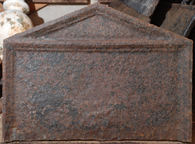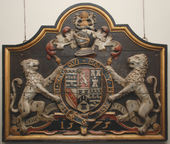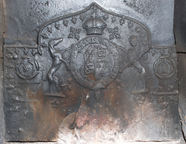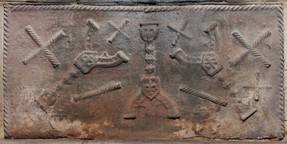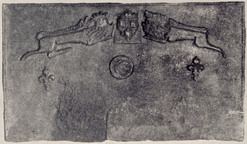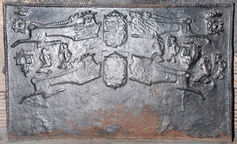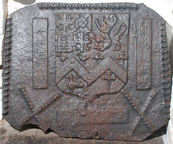-
173
Description: Rectangular; twisted rope edging (top, and top two-thirds of sides); rectangular stamp with griffin passant, repeated six times: two in top corners; two in bottom corners, rotated left; two in middle, separated by two inverted shields bearing a rose and crown, placed vertically; across each top corner, a length of twisted rope.
Notes: Five other firebacks bearing these stamps are known: one is also in Hastings, and one, dated 1569, is at Hadlow Down, Sussex. The locations of the other three are not known.
- Decoration tags:
- rectangular (shape)
- rope (edging)
- simple stamps
- carved stamps
- heraldic
- objects
Manufactured: in the mid- to late-16th century in the Weald area of England.
Current location: Hastings Museum and Art Gallery, John's Place, Bohemia Road, Hastings, East Sussex, England.
Museum number: HASMG: 1909.78 (part of the Hastings Museum museum group)
Citation: Baines, J. M., 1958, Wealden Firebacks (Hastings Museum).
- Attached to series:
- Griffin series
-
186
Description: Plain rectangle with cavetto moulded edging (top and sides); pediment with same moulding.
Notes: Three identical backs, but with various stamps, indicate that the pattern for this fireback formed the base board for them and came from the same source as a distinct series of Tudor heraldic backs. Formerly part of the Ade Collection (from Grove Hill, Hellingly, Sussex).
- Decoration tags:
- triangular arched (shape)
- cavetto (edging)
Manufactured: in the mid- to late-16th century in the Weald area of England.
Current location: Hastings Museum and Art Gallery, John's Place, Bohemia Road, Hastings, East Sussex, England.
Museum number: HASMG: 1952.51.47 (part of the Hastings Museum museum group)
- Attached to series:
- Royal series
- Base boards
- Royal (wreath) series
-
926
Description: Carved wooden fireback pattern. Cavetto-canted rectangle with arch; ovolo-moulded edging; shield, garter, helm, mantling, crest, motto and supporters of William Cecil, 1st Lord Burghley, KG (1520-98). Date below garter.
Notes: William Cecil was Queen Elizabeth I's first minister. Owing to Lord Burghley's motto being merely painted and not carved, as the Garter motto is, the primary purpose of this armorial was probably decorative, and its role as a pattern for firebacks secondary.
Inscription: HONI SOIT QUI MAL Y PENSE / COR VNVM [ET] VIA VNA / 15 75
Arms: William Cecil, KG, 1st Baron Burghley
- Decoration tags:
- rectangular with canted top corners and round arch (shape)
- ovolo (edging)
- whole carved pattern
- planklines
- armorial
- text
Manufactured: in 1575 in England.
Current location: Hatfield House, Hatfield, Hertfordshire, England.
- Attached to series:
- Patterns
- Personal armorial firebacks
-
188
Description: Cavetto-canted rectangle with arch; ovolo-moulded edging; shield, garter, helm, mantling, crest and supporters of William Cecil, 1st Lord Burghley, KG (1520-98). Date below garter.
Notes: William Cecil was Queen Elizabeth I's first minister. The wooden pattern for this fireback (no. 926), itself a fine carved, wooden painted panel, is at Hatfield House, Hertfordshire.
Copies of this fireback are known.
Inscription: HONI SOIT QUI MAL Y PENSE 15 75
Arms: William Cecil, KG, 1st Baron Burghley
- Decoration tags:
- rectangular with canted top corners and round arch (shape)
- ovolo (edging)
- whole carved pattern
- planklines
- armorial
- text
Manufactured: in 1575 possibly in the Weald area of England.
Current location: Hatfield House, Hatfield, Hertfordshire, England.
- Attached to series:
- Personal armorial firebacks
- Armorial panel firebacks
-
189
Description: Rectangular with an ogee arch; twisted rope edging (top and sides); line of small fleurs-de-lys around the top and sides, inside the edging; Tudor rose inside each top corner (overstamped on the left); below each rose an escarbuncle of twisted rope with fleur de lys terminals (understamped); top centre, a Tudor royal shield within an oval garter - HONE SOVT QUEY MAL Y PENSE - with greyhound and lion supporters, and crown above; cross of small fleurs inclined to each side of the crown; inverted 'Y' shape in twisted rope below each supporter, a fleur at the top end of each.
Notes: An oft-used achievement of arms; twisted rope with fleur de lys terminals are seen on other firebacks from the same source; it is a form paralleled on firebacks from the Champagne area of France. The escarbuncle was the principal charge on the arms of the Duchy of Cleves, the same charge on this fireback possibly associating it with the brief marriage of Henry VIII and Anne of Cleves.
Inscription: HONE SOVT QUEY MAL Y PENSE
Arms: Tudor royal (prob. Elizabeth I)
- Decoration tags:
- rectangular with ogee-arch (shape)
- rope (edging)
- carved stamps
- heraldic
- armorial
- royal
- text
- objects
Manufactured: in the mid- to late-16th century possibly at Pounsley Furnace, Framfield in the Weald area of England.
Current location: in private hands, Hatfield, Hertfordshire, England.
-
912
Description: Rectangular; twisted rope edging (top and sides); impression of the end of a firedog repeated three times, one upright in centre, two diagonally inverted with feet angled towards top centre; a large saltire of twisted rope in each top corner, a small saltire, of twisted rope and dowel, on either side of top of central firedog; cross of twisted rope below right hand corner saltire; lower centre, two angled rope lengths either side of central firedog. At the bottom, and outside the feet of the central firedog, two excrescences formed by the pouring of the metal.
Notes: A well-preserved example with an unusual arrangement of the firedog stamp; formerly (c.1886) in the Warbill-in-Tun inn, Warbleton, Sussex.
- Decoration tags:
- rectangular (shape)
- rope (edging)
- simple stamps
- apotropaic
- objects
Manufactured: in the mid- to late-16th century in the Weald area of England.
Current location: in private hands, Heathfield, East Sussex, England.
Citation: Balcomb, J. T., Nov. 1886, 'An Extinct Sussex Art', The Art Journal, pp. 337-340.
- Attached to series:
- Firedog stamp firebacks
- Metalware stamp firebacks
-
191
Description: Arched rectangle; cavetto moulded edging; Tudor royal shield, Garter and crown, with crowned lion and dragon supporters; motto along bottom; Tudor rose to left of crown, portcullis to right.
Notes: This painted fireback is reputed to have been a gift from King Henry VIII to the second Sir William Godolphin, who was present at the Siege of Boulogne in 1544 with a party of Godolphin tin miners. Copies of this style of fireback were advertised in Kings Worthy Foundry's (Winchester) catalogue in the mid-20th century.
Copies of this fireback are known.
Inscription: HONI SOIT QVI MAL E PENSE / DIEU ET MON DROIT
Arms: Tudor royal (Elizabeth I)
- Decoration tags:
- rectangular with round arch (shape)
- cavetto (edging)
- whole carved pattern
- armorial
- text
Manufactured: in the mid- to late-16th century possibly in the Weald area of England.
Current location: Godolphin House, Helston, Cornwall, England.
Museum number: 169480 (part of the National Trust museum group)
- Attached to series:
- Tudor royal armorial firebacks
-
1174
Description: Rectangular; twisted rope edging (top and sides); top centre, crowned shield bearing initials, KH, above a fleur-de-lys, between a leopard passant guardant sinister (on the left) and a leopard passant (on the right); below the rear legs of each leopard, a fleur-de-lys, each inclined slightly outwards at the top; beneath, and slightly to the left of the shield a circular stamp bearing the letter C.
Notes: One of the legs of the leopard on the right is missing, suggesting that the stamps, which appear complete on many firebacks, were well used and had been damaged; this suggests a relatively late use of these stamps. The style of fleur-de-lys is one of two seen on this series of firebacks. The fireback was formerly at Marden Hill House, Tewin, Hertfordshire.
Inscription: C
- Decoration tags:
- rectangular (shape)
- rope (edging)
- carved stamps
- heraldic
- royal
- text
- animals
- objects
Manufactured: in the mid- to late-16th century in the Weald area of England.
Current location: Hertford Museum, 18 Bull Plain, Hertford, Hertfordshire, England.
Museum number: HETFM2893.2 (part of the Hertford Museum museum group)
- Attached to series:
- Royal series
- Fleur-de-lys firebacks
-
322
Description: Rectangular; rope edging (top and sides); two central crowned Tudor shields, one above the other, each with lion passant guardant sinister to the left, and lion passant to right; crowned, barbed, four-petalled rose in right and left corners; two crowned shields with KH in Lombardic characters above a fleur de lys, each irregularly placed between lions on left and right sides; three 'imps' with right arm raised, two on right and one on left between lions; two ‘imps’ with both arms lowered, one on each side in similar positions.
Notes: One of the legs of the leopards on the right is missing, suggesting that the stamp, which appears complete on many firebacks, was well used and had been damaged; this suggests a relatively late use of these stamps. The same heraldic charges can be seen on other firebacks, with other charges, forming the decoration on many other firebacks, suggesting they were the stock of one particular furnace.
Arms: Tudor royal arms of England
- Decoration tags:
- rectangular (shape)
- rope (edging)
- carved stamps
- heraldic
- armorial
- royal
- animals
Manufactured: in the mid- to late-16th century in the Weald area of England.
Current location: Hever Castle, Hever, Kent, England.
- Attached to series:
- Royal series
-
334
Description: Quasi-rectangular; twisted rope lengths along top and sides; centre top, quartered shield between two vertical carved stamps of a billet with five oval shapes; the same billet is repeated horizontally below between two irregular twisted rope saltires.
Notes: The arms are probably of Thomas Wriothesley, who was Henry VIII's last Lord Chancellor and created Earl of Southampton in 1547; he married c.1533 so the arms could date to before then, but the same arms are displayed on his enamelled stall plate in St George's Chapel, Windsor, of 1545, and in stained glass in a window in the parish church at South Warnborough, Hampshire. The shield is, quarterly, 1. Wrythe or Wriothesley quartering Dunstanville and Pink, 2. Drayton, 3. Crocker and 4. Peckham. A candidate for the earliest English fireback with an example of personal arms. A similar fireback is no. 1305.
Arms: Wriothesley (Earl of Southampton)
- Decoration tags:
- rectangular (shape)
- rope (edging)
- simple stamps
- carved stamps
- armorial
- objects
Manufactured: in the mid- to late-16th century in the Weald area of England.
Current location: in private hands, Huddington, Worcestershire, England.
Citation: Gardner, J. S., 25 May 1907, 'Old Wealden Ironwork at Warnham Court', Country Life, pp. 730-2.
- Attached to series:
- Personal armorial firebacks
- Royal series
- Wriothesley firebacks

